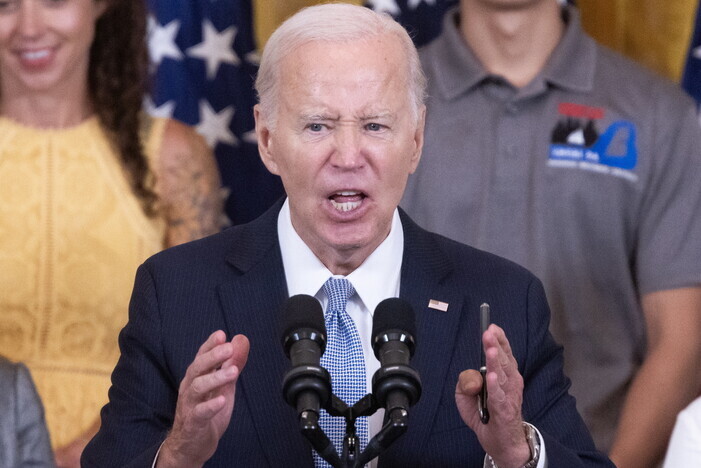hankyoreh
Links to other country sites 다른 나라 사이트 링크
Camp David summit to “lock in” SK-US-JP cooperation, says White House

The White House says initiatives to “lock in” trilateral engagement will be announced during Friday’s summit between South Korea, the US, and Japan at Camp David.
The idea is to “institutionalize” trilateral cooperation so that it cannot be reversed by a change of leadership down the road.
“What you will see on Friday is a very ambitious set of initiatives that seek to lock in trilateral engagement, both now and in the future,” Kurt Campbell, the White House Indo-Pacific coordinator remarked at a Brookings Institution event on Wednesday.
Campbell said the initiatives will be announced in the areas of security, technology and education. John Kirby, the White House National Security Council spokesman, also said at the briefing that “these initiatives will take our trilateral relationship to new heights as we work together to deliver benefits for our people and for people across the region.”
According to Campbell, the summit will include announcements of trilateral summits on an annual basis, technology investments, a hotline between the three countries’ leaders, and commitments to dialogue and engage in critical circumstances.
Mira Rapp-Hooper, the senior director for East Asia and Oceania at the White House National Security Council, said that a “more comprehensive exercise program” and discussions on expanded deterrence cooperation will be held in response to North Korea.
US officials have repeatedly stated that the joint statement and “principles” that will be issued at the summit will make trilateral cooperation among the US, South Korea and Japan irreversible.
“We’re seeking not just to lock in Japan and South Korea for the future, but the US as well,” Campbell said.
The previous day, US Secretary of State Antony Blinken had said that “strengthening our trilateral cooperation” would be at the core of the summit.
This seems to be a statement to seal the fate of trilateral cooperation during the Yoon Suk-yeol administration, to make sure that progress made on such cooperation, including military cooperation, cannot be undone even if historical conflicts flare up again between South Korea and Japan or foreign policies change due to a new government being elected in either country.
US officials also made no secret of the fact that the summit was aimed at keeping China in check.
“China’s entire strategy is based on the premise that America's No. 1 and No. 2 ally in the region can't get together and get on the same page,” said Rahm Emanuel, the US ambassador to Japan, also at the Brookings Institution event.
“Many of these [Indo-Pacific] countries believe that steps that China is taking won't just amend the system but will destroy it or make it much less viable as an institution to propel prosperity and peace,” Campbell said.
By Lee Bon-young, Washington correspondent
Please direct questions or comments to [english@hani.co.kr]

Editorial・opinion
![[Editorial] Intensifying US-China rivalry means Seoul must address uncertainty with Beijing sooner than later [Editorial] Intensifying US-China rivalry means Seoul must address uncertainty with Beijing sooner than later](https://flexible.img.hani.co.kr/flexible/normal/500/300/imgdb/original/2024/0517/8117159322045222.jpg) [Editorial] Intensifying US-China rivalry means Seoul must address uncertainty with Beijing sooner than later
[Editorial] Intensifying US-China rivalry means Seoul must address uncertainty with Beijing sooner than later![[Column] When ‘fairness’ means hate and violence [Column] When ‘fairness’ means hate and violence](https://flexible.img.hani.co.kr/flexible/normal/500/300/imgdb/original/2024/0516/7417158465908824.jpg) [Column] When ‘fairness’ means hate and violence
[Column] When ‘fairness’ means hate and violence- [Editorial] Yoon must stop abusing authority to shield himself from investigation
- [Column] US troop withdrawal from Korea could be the Acheson Line all over
- [Column] How to win back readers who’ve turned to YouTube for news
- [Column] Welcome to the president’s pity party
- [Editorial] Korea must respond firmly to Japan’s attempt to usurp Line
- [Editorial] Transfers of prosecutors investigating Korea’s first lady send chilling message
- [Column] Will Seoul’s ties with Moscow really recover on their own?
- [Column] Samsung’s ‘lost decade’ and Lee Jae-yong’s mismatched chopsticks
Most viewed articles
- 1For new generation of Chinese artists, discontent is disobedience
- 2[Column] US troop withdrawal from Korea could be the Acheson Line all over
- 3[Editorial] Transfers of prosecutors investigating Korea’s first lady send chilling message
- 4[Exclusive] Unearthed memo suggests Gwangju Uprising missing may have been cremated
- 5[Editorial] Intensifying US-China rivalry means Seoul must address uncertainty with Beijing sooner t
- 6Xi, Putin ‘oppose acts of military intimidation’ against N. Korea by US in joint statement
- 7China calls US tariffs ‘madness,’ warns of full-on trade conflict
- 8Could Korea’s Naver lose control of Line to Japan?
- 9China, Russia put foot down on US moves in Asia, ratchet up solidarity with N. Korea
- 10For Korea’s Justice Ministry, no place is sacred from immigration raids